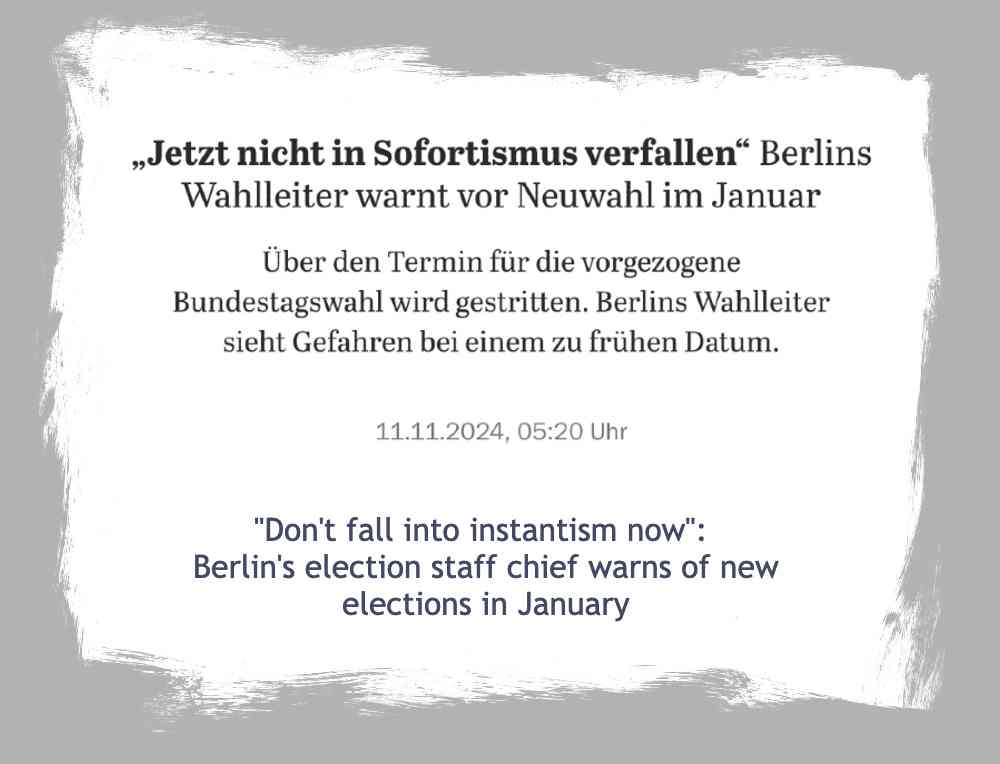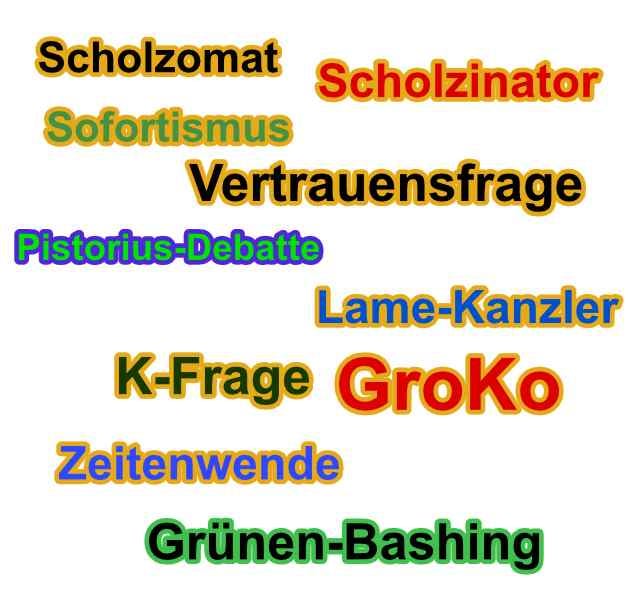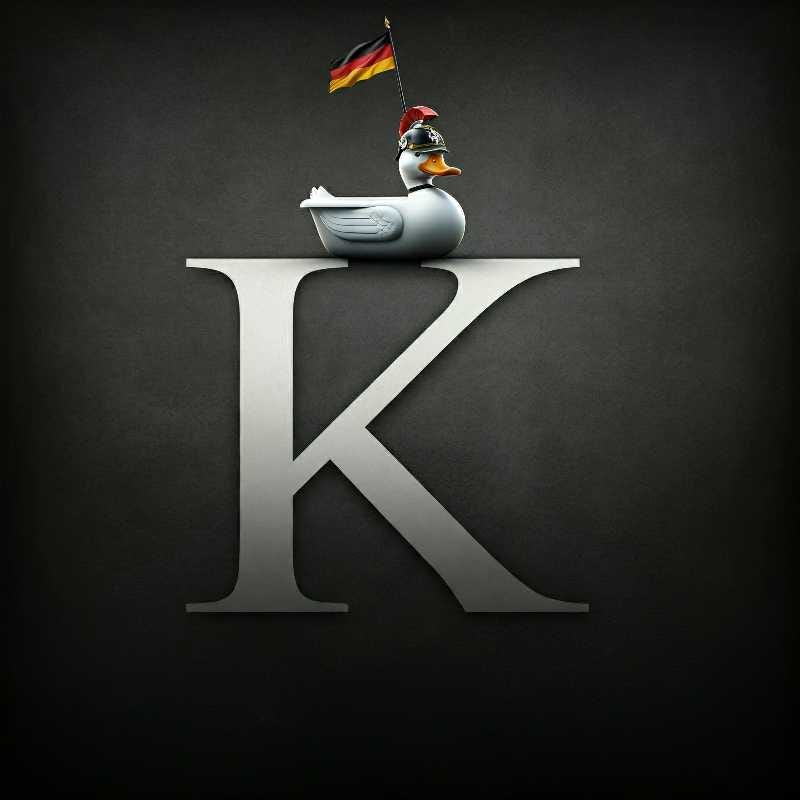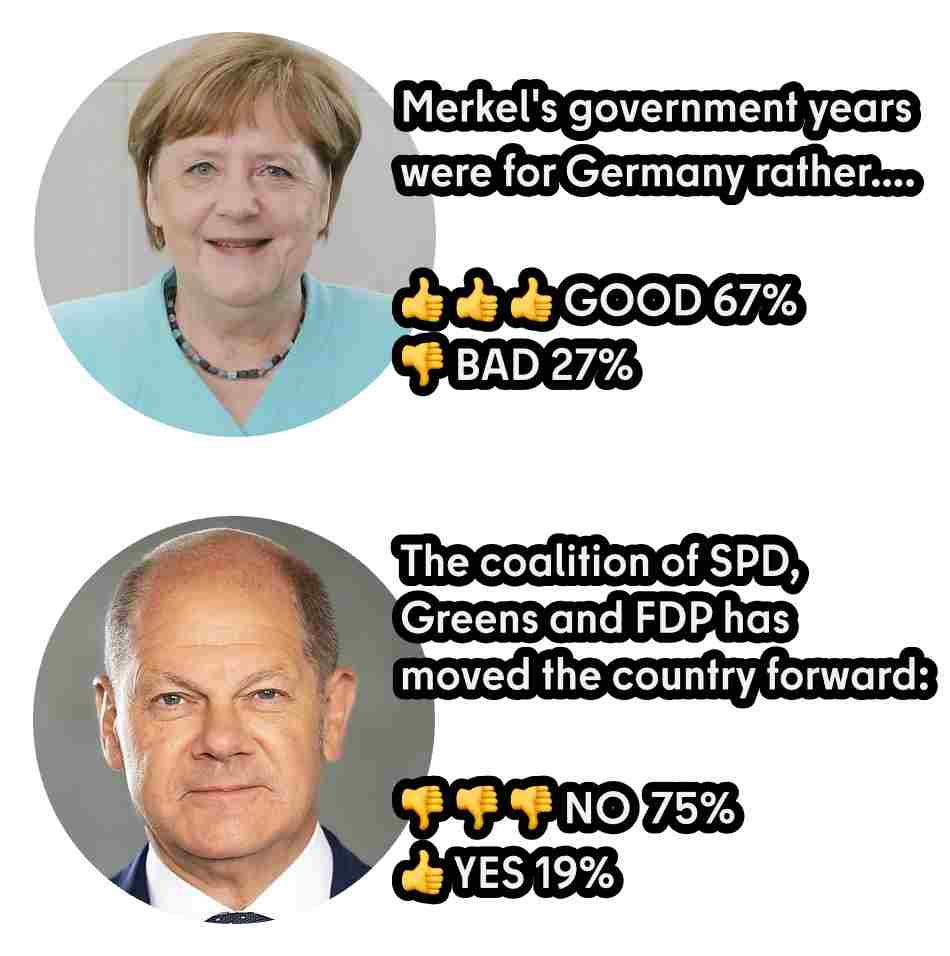There are countries where government crises are a seasonal phenomenon: Italy, for instance, has experienced 66 government crises from 1946 to the present day. There are countries where government crises are a spectacular event. France, for instance, where the president - like a modern-day Sun King - decides alone in a single night to dissolve the government and parliament and send everyone back to the polls. In some other countries, prime ministers are consumed like reality show contestants: Liz Truss will go down in British history for her mere 49 days in office, delivering unexpected winnings to the boldest gamblers. Belgium is the hope of self-government advocates - 652 days without a government and the country is still standing!
Then there is Germany, where a government crisis is nothing less than an epochal phenomenon. It marks generations, separates eras and consigns old leaders to history. Speaking of generations: Generation Z in Germany can't even remember what a government crisis is, let alone how a vote of confidence (in German; die Vertrauensfrage) works. The last time this happened was on 1 July 2005, when Gerhard Schröder (now known as Vladimir Putin's friend and employee) appeared before parliament. After the SPD's defeat in the state elections in North Rhine-Westphalia, he asked first the parliament and then the people whether they wanted to continue with his reformist agenda. The subsequent elections on 18 September 2005 led to the Grand Coalition (aka GroKo) of the first Merkel government, followed by sixteen years of... Merkel.
So if you notice signs of nervousness among your German friends, there's a reason for it. If you notice irony bordering on sarcasm, that too: psychological coping strategies are at play. If you see them suddenly immersed in reading everything they can or asking ChatGPT how the vote of confidence works, be understanding. We are talking about delving into history, books in hand, all the way back to the Weimar Republic!
The Germans have a remarkably expressive, rich and evocative language, and they take refuge in it when events become epochal. The German reverence for words is not a stereotype. We've seen it in action with concepts such as Deutsche Angst, Erinnerungskultur and, in the last three years, Zeitenwende. So today, 90 days before the vote, I'd like to invite you on a journey through the keywords of this crisis - for they are the litmus tests of a crucial moment when we can only hope for a positive, let's say reasonable, outcome.
From Scholzomat to Scholzinator
The Metamorphosis of Dr. Scholz.
First there was the Scholzomat, a neologism coined in 2021, meaning "Scholz automatic responder". It described an aseptic, repetitive way of speaking, often filled with circumlocutions to avoid committing to a yes, no or how. Something more or less like this:
«We will do everything that must and can be done.»… «And what is that, Herr Kanzler?» … «What will circumstances demand of us.» … «In practice, can you give an example?» … «What is in our power to do.» END OF CONVERSATION.
Recently, the tone and content have begun to change, particularly with the frequent use of the 'word of command' - das Machtwort - an authoritative statement that ends discussions based on the speaker's position of power, in this case the Chancellor. At 9.15pm on Wednesday 6 November, we witnessed the culmination of this metamorphosis: minutes of prepared speech, read from a teleprompter, full of accusations, resentment and bitterness. This was the speech of a chancellor who, hours earlier, had sacked his finance minister, brought down his government and launched the most complex election campaign in recent German history.

This aggressive, almost cruel Scholzinator wants to project strength and decisiveness. But this is Germany, where, at least for the time being, people are still inoculated against strongmen. "Der Ton macht die Musik" (The tone makes the music) is a common German saying: while a harsh tone may be appropriate in a Kneipe or a public square, it's less so in the halls of power.
The silent majority in this country still expects to be governed by those who are more intelligent, capable and emotionally stable than the average citizen.
Indeed, in these first weeks of the election campaign, this Scholzinator isn't winning over the public. He is consistently at the bottom of the polls, both in terms of popularity and likeability. Another term aptly explains this lack of public approval: the German compound "der Besserwisser". It describes someone who thinks he knows more than others and isn't afraid to show it - a know-it-all, an arrogant person, the classmate you don't remember fondly. Olaf: the Besserwisser.
der Sofortismus
«I want everything,
and I want it now»
The most surprising element of Olaf Scholz's fifteen-minute speech to the nation was its conclusion: his declared intention to call off the confidence vote on 15 January, postponing possible elections until the end of March 2025. This announcement came after he had spent the previous fourteen minutes dismantling an alliance that had been hailed as revolutionary barely three years earlier.
Within minutes of Scholz's speech, the opposition's response was thunderous: "Now to parliament, tomorrow to the polls!" In the days that followed, the creativity of the German language shone through with the emergence of a rare term: Sofortismus. You won't find this word in the Duden dictionary, the Langenscheidt catalogue or even the Digital Dictionary of the German Language of the Berlin-Brandenburg Academy of Sciences and Humanities. It's a pseudo-Latinism. It's a neologism that reflects our modern world of smartphones, apps and social media, and the psychological impact they've had - returning us to a childlike state where we demand everything, immediately!

Ironically, it was Scholz's own circle and the SPD who were now warning against a rush to elections. They cite various reasons: the need to pass important laws (but with what majority, given the collapse of the coalition?), to give citizens time to think (although many have already made up their minds), and the logistics of organising elections - including, bizarrely, securing enough paper for ballots. Yes, Germany in 2024, the world's third largest economy, is apparently facing a paper shortage.
On the morning of Sunday 10 November, Poland - one of Europe's largest timber and paper producers - offered aid via social media if Germany expedited a political solution to the crisis. Hours later, not because of Poland's offer, but after negotiations between the SPD and the CDU, Sofortismus was set aside. The chancellor will now face a vote of confidence on 11 December, with elections scheduled for the 23-25th of February - the 25th being Fat Thursday in the Catholic Länder. This time we're voting during carnival. Oh my!
die Vertrauensfrage
the Vote of Confidence
What does the Weimar Republic
have to do with this?
Without going into the intricacies of comparative constitutional law, there's one key aspect to understand about European countries: with the exception of France's semi-presidential system, all European parliaments first vote to confirm their government and can later vote no confidence in it. Similarly, the government can ask for a vote of confidence on specific measures or on its overall performance. Parliaments can also initiate a vote of no confidence. In some countries, they don't even need an alternative majority to form a new government. This is the case in Italy, where crises are often resolved within parliament - through the formation of new majorities, even temporary ones, or through MPs changing parties. Something that Germany - a nation averse to parliamentarians changing sides and, above all, allergic to instability - could not afford. This aversion stems from a collective memory of where instability can lead.
This brings us back to the Weimar Republic, which collapsed after only 13 years, 21 governments and 11 chancellors. The Weimar constitution, while socially progressive in some respects, contained archaic elements and others that proved too loose.
On the one hand, the powers granted to the head of state were reminiscent of those of the former Kaiser: the Reich President had almost unlimited powers to dissolve parliament - which led to forced elections three times between 1930 and 1932. In addition, the president could easily declare a state of emergency to 'maintain public safety and order in the German Reich'. The same head of state had the power to appoint the Reich Chancellor and ministers independently of parliamentary majorities, usually choosing from among his favourites.
On the other hand, it was extremely easy for the Reichstag to dismiss the Chancellor: a vote of no confidence could be taken without providing for alternative majorities - it was enough to gather a majority of parliamentarians just for that vote. This so-called “destructive vote of no confidence” allowed the Reichstag to force the Chancellor to resign, thus bringing down a government without having to install a new one. With chancellors appointed by the head of state (arbitrarily, as mentioned above) but not tolerated by the parties, the result was a back-and-forth of new nominees and no-confidence votes. This became particularly virulent in 1932. What followed was 1933.
That is why the current German constitutional system, although not without its critics, is far more cautious. Here, the Chancellor can ask for a vote of confidence – die Vertrauensfrage – either to strengthen his majority or to acknowledge its end.
This presents a paradox that some constitutionalists criticise: how can a chancellor ask his parliamentary majority to vote against itself, even against their own conscience? Today, for example, many think that this Ampelkoalition should have continued until the end of its mandate!
As soon as the Chancellor receives a vote in Parliament stating that the government majority no longer exists, he has two options: he can go to the Federal President and ask for the Bundestag to be dissolved, or he can try to work with a minority government. As for parliament, they have another type of vote at their disposal: the vote of no confidence - das Misstrauensvotum. This means that they can only topple the Chancellor by replacing him with a new Chancellor in the same vote - the so-called "constructive vote of no confidence". In 1949, this was a real constitutional innovation that set a precedent: Spain and Belgium also adopted the idea when they reformed their constitutions. It makes the system stable by setting a very high bar for Parliament to dismiss a government.
To conclude this review of one of the most searched keywords in Germany today - die Vertrauensfrage - here is the list of chancellors who have asked the question of trust in the history of the Federal Republic of Germany:
1972 by Willy Brandt
1982 by Helmut Schmidt
1982 by Helmut Kohl
2001 by Gerhard Schröder
2005 by Gerhard Schröder.
Statistically, the Social Democrats have shown the greatest willingness to take this political risk, with a ratio of 4:1 compared to the Christian Democrats. Good luck!
Lame-Kanzler
The “lame duck” Chancellor
Never before in the history of the Federal Republic of Germany has the authority of a head of government crumbled as dramatically as it has in recent years. The decline began in 2021, when the Federal Constitutional Court ruled against the federal government on the second supplementary budget for 2021. This budget contained obvious tricks to increase government spending without formally breaking the strict rules on public debt (the debt ceiling, another very German word). Olaf Scholz has gone from being the chancellor of the Zeitenwende to perhaps the most powerless chancellor Germany has ever had. Indeed, he has officially become a "lame Kanzler", a lame duck sitting in the Berlin Chancellery.
But the lame-duck Chancellor behaves as if nothing has happened, still organising repetitive industry summits called "Discussions between Chancellor Scholz and representatives of industry associations, trade unions and individual companies". At the most recent summit, held a few days ago, the invited participants were far less enthusiastic about attending. After all, the "Ampelkoalition" is broken and the big problems can only be solved by a new government - if they can be solved at all. So what's in it for the industry? The top executives of Germany's largest and most dramatically affected company, Volkswagen, have therefore declined the Chancellor's invitation. They are already waiting for the next one.
The next Kanzler(in)… who?
Die K-FRAGE
The German language can be remarkably concise when it wants to be: the K-Frage - the question of who will run for chancellor - is more than just a question. It's an extra-constitutional election debate. In Germany, there's no such thing as a chancellor candidate directly elected by the people. Governments and chancellors are formed in parliament. But in this era of personalised politics, it's become inevitable for every German party to have a frontrunner as its candidate for chancellor.
It's almost comical: even with a meagre 12% in the polls, the Green Party's Robert Habeck is considered a chancellor candidate. The K question is becoming a real headache for the SPD, a party that's been chewing through leaders like a political wood chipper over the past decade. After its lucky break in 2021 - an unexpected 25.5% - the SPD now finds itself in a desperate fight for second place, with the far-right AfD breathing down its neck.
So which horse to back? For a week now, we've been treated to a social democratic psychodrama: the current chancellor, our know-it-all Scholz, is also the candidate for chancellor in 2025. But Germany's most popular politician is the social democratic defence minister, Boris Pistorius. With him, second place after the Christian Democrats seems within reach. With Scholz? Well, finishing behind the AfD isn't out of the question..
The verdict? There isn't one yet. This psychodrama is still unfolding. But knowing the ultra-tactical tendencies of the SPD, I'd wager that they'll let Scholz fight for the chancellorship, only to swap him for Pistorius after the election as a partner in a new... GroKo! Because after all this merry-go-round, we could end up right back where we started: with the reassuring, moderate, oh-so-German Grand Coalition.
GROKO, die Große Koalition:
The seemingly inevitable Grand Coalition
between Christian Democrats and Social Democrats
A spectre is haunting Germany: the seemingly inevitable return of the Grand Coalition between Christian Democrats and Social Democrats. The new fragmentation of German politics - with the far-right AfD gaining strength and unpredictable left-wing forces like Sahra Wagenknecht's Bündnis BSW emerging - is pushing towards a reassuring, "not too liberal" centrism. In the old traffic-light coalition, the yellow light of the FDP liberals could flicker out, perhaps permanently. It's a sad prospect, especially when liberal thinking is contributing so much elsewhere in Europe - Estonia's Kaja Kallas comes to mind.
In this world of illiberals - where even Hungary's Orbán is crafting his cherished model of "illiberal democracy" - there is an urgent need for true liberals. I'm talking about those who have absorbed the ideas of Dahrendorf, Arendt and Popper. The Greens could fill this role, but they're split between two shades of liberal green: Robert Habeck's realistic, serious, post-Merkelian wing, and a more "woke", somewhat out-of-touch faction. The Germans call the latter "left-liberals".
So we're left with the GroKo. And GroKo inevitably evokes Merkel: of the four grand coalitions in the history of the Federal Republic, one took place in the late 1960s, while the other three were all led by Merkel. Which brings us to the other spectre haunting this election campaign: the “Merkel gap”, die Merkel-Lücke.
die Merkel-Lücke:
There is a void left by Merkel.
Who will fill it?
Reckoning with past leaders is a German tradition: Helmut Kohl, Gerhard Schröder and, of course, Angela Merkel have all endured it. Adored during their time in office, they're later blamed for all the country's ills. Consider the dependence on Russian gas, often blamed on Merkel. When West Germany and Italy began importing significant amounts of gas from the Soviet Union in the 1970s, Merkel was still a physics researcher in East Germany. In the 80s and 90s, energy-hungry and rapidly expanding German industry wouldn't have given up this gas. Any government would have been expected to secure better deals, not to develop visionary energy strategies. Visions have, thankfully, fallen out of favour in post-war Germany. Helmut Schmidt, Social Democratic chancellor from 1974 to 1982, famously quipped:
«Wer Visionen hat, sollte zum Arzt gehen.»
«If you have visions, you should see a doctor.»
The deconstruction of Angela Merkel's legacy, however, appears to be a media-orchestrated operation to further distance an uncomfortable past. Today we're beginning to hear simple, perhaps oversimplified, but thought-provoking judgements on the streets: «Things were better with Merkel. Now they're worse.» The Merkelians - full disclosure: I'm one of them - are a quiet bunch looking for a political home. Many doubt that it can be a CDU that sometimes seems to be chasing populists and is backward on both environmental and social issues. That's where the Greens scored in the 2021 elections: it was the Merkelians who pushed them to 14.8% of the vote. And that's where Habeck will try to fish again. It's not impossible, but after three years of this government it won't be easy. Especially since the Greens have become the scapegoat for everything people don't like. Which brings us to the phenomenon of the past 12 months: Green-bashing.
Grün-Bashing, or green-bashing:
the tendency to blame the Greens for everything.
Perhaps the traffic light government's biggest mistake was failing to revise its entire programme after Russia's invasion of Ukraine. The changing times demanded more than just eliminating dependence on Russian gas and ensuring Germans had a comfortable winter in 2022-23 - everything needed recalibration. Instead, after narrowly avoiding cold radiators and impressively hosting over a million Ukrainian refugees, the government simply resumed implementing its original coalition agreement.
But after 1,000 days of war in Europe and a geopolitical situation eerily reminiscent of the 1930s, who in the population, industry or business is really ready to embrace the myriad changes Germany needs? With growing insecurities and an economy doomed to stagnation, who's looking to the future, especially the long term?
The Greens, always the champions of future generations, now bear the blame for every source of insecurity and irritation: top-down politics, overly lax migration, not to mention the whole spectrum of gendered language, wokeism and political correctness. It's all become boringly predictable. And dangerous. If you alienate potential future allies - mind you, Christian Democrats and Greens govern together quite effectively at the regional level - who's left?
Germany is not just a parliamentary republic; it's a political system that thrives on coalitions, large and small. No coalitions means no government. No government creates a power vacuum - a potential nightmare for Germany and Europe.
For those of you with a knack for German and a desire to see green-bashing in action, I recommend a clever online game from the satirical newspaper Der Postillon: the Green Party Criticism Generator. I typed in "bathtub" (Badewanne) and got this gem:
You could relax wonderfully in a bathtub while the Greens splash around forever in the mud of their own stubborn ideologies with their wholesome eco-fairy tales - perhaps they should book a one-day course in reality!
Conclusion: turning away from the Zeitenwende. Here is the “peace Chancellor”, der Friedenskanzler.
In German, the phrase sounds like a wordplay: "Abwendung von der Zeitenwende". This election campaign has begun with a Chancellor who presents himself as a man of peace. The first signs, as I mentioned in one of my posts, were seen in the European elections.
A few days ago, the sequel: a phone call between Chancellor Scholz and Vladimir Putin. Truly productive! The day after we saw one of the most ferocious rocket attacks on Ukrainian cities - all in defiance of international law, all war crimes, but we won't see people taking to the streets to show solidarity with Ukraine.
This German election campaign will be short and sadly cynical: there will be talk of peace, but not of justice. And certainly not of war: which is already underway, sabotage after sabotage, in the Baltic and the Black Sea. And it's causing casualties on a scale not seen since the Second World War. Our losses, European losses. But for the next ninety days we're going to pretend that nothing is happening. We'll talk about peace, we'll continue to put the peace dove on our posters, and we'll leave it to the Swedes to send everyone the instructions for the worst case scenario.
We'll think about it in March.
If Ukraine still exists.
Postscriptum (24.11.24)
Two more words entered my essential repertoire of the German government crisis this weekend: the first is "shitshow" in English (since no German equivalent exists). The head of the SPD youth organization, the Jusos, used this term at the Young Social Democrats congress podium to describe the two weeks of zigzagging, debates, and discussions that ultimately led to Olaf Scholz's confirmation as chancellor candidate (as expected—they'll keep him for now, only to set him aside after the elections).
But the second word… well that´s another type of show - the typical merkelian way to comment, tongue in cheek, the overall situation that led to the fall of the Ampelkoalition: “Männer”, males.
What she meant: a bunch of egotists peoplr putting the fist on the table and unable - as she hase been to do over 16 years - to zip her lips and stay on negotiation tables if necessary all night long, to get to a decent results.
The word has benn used as the headline of the current Spiegel magazine cover: as you might know, unless you live on planet Mars, that today in Germany we are starting officially our Merkel-week: her memoire will be released tomorrow worldwide, and the Country will spend day and night talking about it, interviweing Merkel, reading and rusching to make their own comments. Of course I will be reading too, but with calm: those 720+ pages desere to be consumed with care, not scanned with the only purpose to be the first to comment. And, by the way, what will be truly interesting in the next weeks will be if - as I suspect…. and make my bid on - a new phenomenon of “Merkel-gia” merkel-nostalgia will emerge, after three years spent on the demontage of her memory. I put my five euros on the table and patiently wait for this to happen 🙂


















Share this post